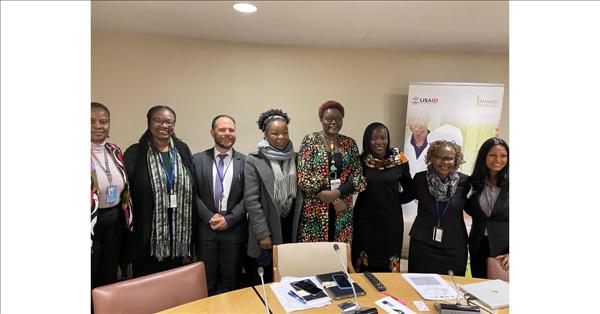(MENAFN- EIN Presswire) Speakers at AWARD's high level side event at the UN's Commission on the Status of Women
Development experts call for African governments to adopt policies that close the gender gap in agriculture at the UN's Commission on the Status of Women.
We know that closing the gender gap in agriculture would generate significant gains for Africa's agriculture sector and for society at large.” - Susan Kaaria, Director of AWARDNEW YORK, UNITED STATES, March 20, 2023 /einpresswire.com / -- Gender experts appearing at the UN's Commission on the Status of Women called for more policies to address the specific needs of women to help boost food security in Africa.
A high-level side event, organized by African Women in Agricultural Research and Development (AWARD), featured panellists from the UN Committee on Food Security, UN Women and USAID and was co-hosted by the Permanent Missions to the UN from Kenya, Malawi, Nigeria and Uganda.
“All the deliberations over these past two weeks have shown that the world is not on track to meet many of the UN's Sustainable Development Goals (SDGs) by 2030 and that there are still substantial gender inequalities in agriculture, in food systems, in technology access,” said Susan Kaaria, Director of AWARD.
“We know that closing the gender gap in agriculture would generate significant gains for Africa's agriculture sector and for society at large. For this to happen, policies have an important role to play in eliminating gender-based discrimination and addressing underlying causes of gender inequality in food systems.”
Ahead of the Commission on the Status of Women, the UN's International Fund for Agricultural Development (IFAD) called for $614 billion to help tackle food insecurity in Africa while the World Bank has disbursed half of its $12 billion food relief fund to African countries.
evidence indicates that women tend to spend more of their incomes on meeting the crucial needs of household health, nutrition and education – all of which will support the continent to achieve its shared development goals.
However, a 2015 report by UN Women estimated the gender gap in agriculture amounted to $100 million in Malawi alone, while closing the gender gap in agricultural productivity could lift as many as 238,000 people out of poverty.
“Women have been working for food systems all along - it's time that we make food systems work for women by investing in just and equitable food systems,” said Dr. Jemimah Njuki, Chief, Economic Empowerment, UN Women.
The event heard about programs in Malawi designed to improve women's access to weather and climate information, agricultural inputs and financing, while the Kenyan government has ensured land rights for women through its laws and policies.
“Despite the dominance of women in the agricultural sector, gender inequality continues to affect the sector because there are disparities between men and women in access to and control over production resources and services,” said Fred Simwaka, Deputy Director of Gender Affairs, and a senior member of the Malawi delegation to the Commission on the Status of Women.
“The Government of Malawi is implementing a number of interventions that are aimed at improving women's access to productive resources and marketing opportunities while also addressing issues of labour.”
H.E. Ambassador Gabriel Ferrero, Chairperson of the UN Committee on World Food Security, added:“We need to embrace systems thinking to ensure holistic approaches because we cannot address the gender inequalities in isolation of other systemic issues.”
Meanwhile, AWARD, well-known for designing and implementing career-development programs for African women scientists in leadership, recently launched a call for the second cohort of its gender responsive agriculture systems policy (GRASP) Fellowship for women who are citizens of Burkina Faso, Ethiopia, Madagascar, Mozambique, Rwanda and Senegal.
The USAID-funded GRASP Fellowship is a career development program that provides customized training for mid-career African women to accelerate the design and implementation of gender-responsive agricultural policies across Africa.
“We are championing gender responsiveness to become an embedded cultural norm and practice in African agricultural research and development,” added Dr. Kaaria.
“The GRASP Fellowship allows AWARD to work toward advancing gender-responsiveness across agricultural and food systems policy.”
The call for applications is open until 23:39 EAT, April 12, 2023 and more information is available online .
Ends
About AWARD
African Women in Agricultural Research and Development (AWARD) works toward inclusive, agriculture-driven prosperity for Africa by strengthening the production and dissemination of more gender-responsive agricultural research and innovation. We invest in African scientists, research institutions, and agribusinesses so that they can deliver agricultural innovations that better respond to the needs and priorities of a diversity of women and men across Africa's agricultural value chains.
Donna Bowater
Marchmont Communications
+61 434 635 099
MENAFN20032023003118003196ID1105814003
Legal Disclaimer:
MENAFN provides the
information “as is” without warranty of any kind. We do not accept
any responsibility or liability for the accuracy, content, images,
videos, licenses, completeness, legality, or reliability of the information
contained in this article. If you have any complaints or copyright
issues related to this article, kindly contact the provider above.




















Comments
No comment